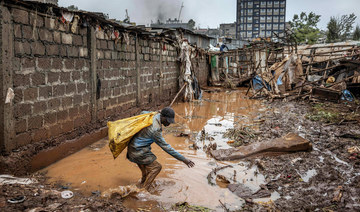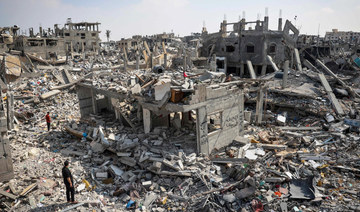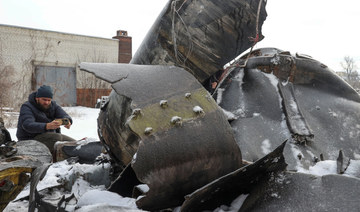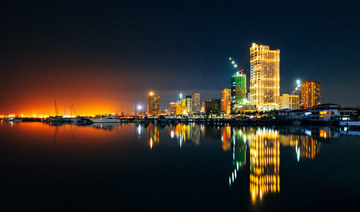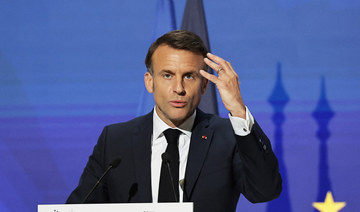JERUSALEM: Israel’s premier said Sunday his country had a “moral obligation” to help stem fighting in Ukraine even if chances of success were “not great,” after shuttle diplomacy that saw him visit the Kremlin.
Prime Minister Naftali Bennett met for three hours with Russian President Vladimir Putin at the Kremlin on Saturday, before flying to Berlin to meet Chancellor Olaf Scholz.
Bennett, acting after Kyiv asked him to launch a dialogue with Moscow in the wake of Russia’s invasion, has also held three phone calls in 24 hours with Ukraine’s President Volodymyr Zelensky.
Speaking before his weekly cabinet meeting, Bennett said he could “not expand further” on his talks, but that Israel would press on with its diplomatic efforts “as needed.”
“Even if the chance is not great — as soon as there is even a small opening, and we have access to all sides and the capability — I see this as our moral obligation to make every effort,” he said.
Bennett has so far walked a cautious line on the Ukraine conflict, seeking to preserve delicate security cooperation with Russia, which has a large military presence in Israel’s northern neighbor, Syria.
Bennett has not joined Western leaders — notably key ally the United States — in forcefully condemning the Russian invasion, instead stressing Israel’s strong relations with Moscow and Kyiv.
Israel said Bennett’s trip was coordinated with Washington and major European powers, but Israeli media have reported that American officials have expressed doubts that Bennett can influence Putin’s actions.
Bennett’s sit-down with Putin was the first by a foreign leader since Russian forces invaded Ukraine on February 24.
They also discussed the fate of the Jews in Ukraine and Russia.
Israel’s Interior Minister Ayelet Shaked said Sunday that Israel is preparing for an estimated 100,000 people from both countries to move to Israel, under laws that allow people with verifiable Jewish lineage to become Israeli citizens.
A group of 300 Ukrainian Jews were due to land Sunday.
Shaked also said that since the outbreak of the conflict, 2,034 Ukranian refugees had entered Israel, 90 percent of whom do not qualify for the “law of return” that applies to those with Jewish lineage.
Bennett and Putin also discussed ongoing talks in Vienna aimed at reviving the 2015 Iran nuclear deal, which Israel staunchly opposes.
On Saturday, Iran and the UN nuclear watchdog said they had agreed an approach for resolving issues crucial to restoring the nuclear pact, which was derailed after the US unilaterally withdrew in 2018 and then ramped up sanctions on Tehran.
Those issues centered on outstanding questions the International Atomic Energy Agency has about the past presence of nuclear material at undeclared sites in Iran.
Shortly before news of Bennett’s Moscow trip emerged, Russia said it would seek guarantees from the US before it backs a renewed Iran deal, potentially scuppering hopes of an imminent agreement.
Russia is a party to the Iran talks but is itself heavily sanctioned over its invasion of Ukraine.
Foreign Minister Sergei Lavrov said Russia had requested that the US give it written guarantees that Ukraine-related sanctions “will not in any way harm our rights to free, fully-fledged trade and economic and investment cooperation, military-technical cooperation with Iran.”
There has been no comment by Israel on a link between Bennett’s Russia-Ukraine diplomacy and any efforts by the Jewish state to oppose a new Iran deal.
Speaking Sunday, Bennett praised IAEA chief Rafael Grossi for not agreeing “to close the open files” on Iran’s past nuclear activity, as Tehran has demanded.
“The disadvantages of the (Iran nuclear) agreement far outweigh its advantages,” Bennett said.
Nadav Eyal, a commentator in Israel’s Yediot Ahronot newspaper, warned that Bennett had undertaken a “very high-stakes gamble,” and that “if it emerges that Putin only used Bennett and deceived him,” the Israeli premier could face “major political ridicule.”
Israeli PM vows more Ukraine talks, even if prospects ‘not great’
https://arab.news/2zs6k
Israeli PM vows more Ukraine talks, even if prospects ‘not great’

- PM Naftali Bennett met for three hours with Russian President Vladimir Putin at the Kremlin on Saturday
- PM Bennett has also held three phone calls in 24 hours with Ukraine’s President Volodymyr Zelensky
Kenya flood toll rises to 179 as homes and roads are destroyed

- The death toll in Kenya exceeds that from flooding triggered by the El Nino weather phenomenon late last year
- Last year’s rains followed the worst drought in large parts of East Africa in decades
NAIROBI: Floods and landslides across Kenya have killed 179 people since March, with hundreds of thousands forced to leave their homes, the government said on Wednesday, as dozens more were killed in neighboring Tanzania and Burundi.
Torrential rain and floods have destroyed homes, roads, bridges and other infrastructure across the region. The death toll in Kenya exceeds that from flooding triggered by the El Nino weather phenomenon late last year.
Last year’s rains followed the worst drought in large parts of East Africa in decades.
In Kitengela, 33 km (20 miles) from Nairobi, Kenya Red Cross workers were helping to rescue residents whose homes were marooned by flood waters.
They were also trying to rescue tourists trapped at camps in Narok, 215 km from Nairobi, the Kenya Red Cross said on X.
Nairobi’s highways authority said it had closed a section of a highway leading to the city and at least three other roads across the country due to flooding and debris.
The disaster prompted Pope Francis to speak out in sympathy with Kenyans during a general audience on Wednesday at the Vatican.
“I ... wish to express to the people of Kenya my spiritual closeness at this time as severe flooding has tragically taken the lives of many of our brothers and sisters, injured others and caused widespread destruction,” he said.
More war debris in Gaza than Ukraine: UN

- UNMAS estimated the amount of debris in Gaza at 37 million tons in mid-April or 300 kilogrammes per square meter
- “Gaza has more rubble than Ukraine, and to put that in perspective, the Ukrainian front line is nearly 1,000 kilometers long, and Gaza is 40 km long,” said UNMAS’s head Mungo Birch
GENEVA: The Gaza Strip is filled with more war debris and rubble than Ukraine, the head of UN demining operations for the narrow Palestinian territory said Wednesday.
And the danger for clearance work is restricted not just to unexploded ordnance but includes possible exposure to toxic substances such as asbestos.
The United Nations Mine Action Service (UNMAS) estimated the amount of debris in Gaza at 37 million tons in mid-April, or 300 kilogrammes per square meter.
“Gaza has more rubble than Ukraine, and to put that in perspective, the Ukrainian front line is 600 miles (nearly 1,000 kilometers) long, and Gaza is 25 miles (40 km) long,” said Mungo Birch, head of the UNMAS program in the Palestinian territories.
But the sheer volume of rubble is not the only problem, said UNMAS.
“This rubble is likely heavily contaminated with UXO (unexploded ordnance), but its clearance will be further complicated by other hazards in the rubble,” Birch told journalists.
“There’s estimated to be over 800,000 tons of asbestos, for instance, alone in the Gaza rubble.” The cancer-causing mineral used in construction requires special precautions when handling.
Birch said he hoped UNMAS, which works to mitigate the threats posed by all types of explosive ordnance, would become the coordination body for mine action in Gaza.
It has secured $5 million of funding but needs a further $40 million to continue its work in Gaza over the next 12 months.
However, “the sector as a whole will need hundreds of millions of US dollars over multiple years in order to make Gaza safe again for the population,” Birch added.
The Gaza war started after Hamas’s October 7 attack on southern Israel, which resulted in the deaths of 1,170 people, mostly civilians, according to an AFP tally of Israeli official figures.
Israel’s retaliatory offensive has killed at least 34,568 people in Gaza, mostly women and children, according to the health ministry in the Hamas-run territory.
Philippines bets on wellness, medical tourism to attract Middle Eastern visitors

- Philippines wants position as a leading halal tourism destination
- Nation aims to welcome 7.7m international visitors in 2024
MANILA: The Philippine tourism sector is shifting to promote the country as a medical and wellness destination, expanding beyond its recreational profile to attract more visitors from the Middle East.
More than 2 million international travelers visited the Philippines since the beginning of the year, with receipts between January and April reaching $2.7 billion. This data, the Department of Tourism said last week, was a 120 percent recovery rate from the same period in 2019 — before COVID-19 lockdowns brought the industry to a standstill.
The department’s data also showed a 10 percent increase in visitors arriving from Gulf countries, especially Saudi Arabia and the UAE, which are among the Philippine government’s key emerging-market targets.
To further boost their arrivals and make the country a more attractive destination, tourism stakeholders are shifting their strategy to focus more on the wellness sector, Philippine Tour Operators Association President Arjun Shroff told Arab News.
“This strategic shift aims to position the Philippines as an emerging medical and wellness destination in Asia, expanding beyond its traditional recreational tourism offerings like beaches and diving spots,” he said.
Efforts have also been undertaken to expand the footprint of halal services and goods.
The predominantly Catholic Philippines — where Muslims constitute about 10 percent of the nearly 120 million population — plans to raise 230 billion pesos ($4 billion) in investments and generate around 120,000 jobs by expanding its domestic halal industry by 2028.
The cross-sector efforts include tourism as well, with the Philippines trying to position itself as a leading halal tourism destination.
“We have recently implemented a range of strategic initiatives to enhance our appeal to visitors from the Middle East. Central to our approach is a commitment to inclusivity, ensuring that all tourists feel welcome and safe,” Shroff said.
“In line with this commitment, we have actively promoted halal establishments to cater to the dietary preferences of Middle Eastern travelers. By offering a variety of halal dining options, we aim to provide a seamless and enjoyable culinary experience.”
Filipinos have been exposed to the Middle East, especially Gulf countries, which are home to some 2 million Philippine expats. They understand cultural differences and many also know Arabic.
The tourism sector has lately been tapping into Arabic-speaking talent to help facilitate tours for Middle Eastern travelers.
“We have invested in bilingual tour guides proficient in Arabic ... These guides play a vital role in facilitating communication, providing valuable insights, and enhancing the overall experience for our Middle Eastern guests,” Shroff said.
“Philippine travel and tourism agencies strategically target the Middle East market ... (it) holds great potential for the Philippines.”
In 2024, the Philippines is targeting to welcome 7.7 million international visitors, nearly its pre-pandemic record-breaking achievement in 2019 which ended with 8.26 million inbound arrivals.
Resurgent terror groups in Afghanistan will strike West, warns resistance leader

- Exiled head of National Resistance Front says Al-Qaeda, Daesh presence growing in country
- Taliban emboldened by Western commitment to Ukraine, focus on Middle East
London: Terrorist groups in Afghanistan are regrouping in the wake of the Western evacuation from the country and will strike on US and European soil, the leader of an anti-Taliban movement has warned.
The exiled leader of Afghanistan’s National Resistance Front, Ahmad Massoud, said a terror attack in the US or Europe is “not about a matter of if, it’s a matter of when,” The Independent reported.
Massoud said circumstances in the country and the wider region resemble the pre-9/11 landscape, with terror training camps opening across Afghanistan.
Ali Maisam Naziry, the NRF’s head of foreign relations, said of the resurgent groups: “The attacks in Russia, Iran and Brussels, and the neutralised attack in Germany, are examples of how fast they are moving to threaten global security.”
He added that since the Taliban’s return to power in 2021, Afghanistan has witnessed a “massive influx” of foreign terrorist fighters who belong to the more than 20 militant networks operating in the country, including Al-Qaeda, Daesh-Khorasan and the Haqqani Network.
Massoud warned that the West’s commitment to Ukraine and Israel is serving as a distraction, emboldening the Taliban in the process.
Afghanistan is “no longer a priority” for the Biden administration in the US, he told The Independent last year.
Nathan Sales, a former US ambassador-at-large and coordinator for counterterrorism, said last year: “The continued partnership between the Taliban and Al-Qaeda is perhaps best seen in the fact that after the US withdrawal, Al-Qaeda leader Ayman Al-Zawahiri resurfaced in Afghanistan, living in a safe house associated with the Haqqani Network, a Taliban faction that maintains close ties to Al-Qaeda and is itself a US-designated Foreign Terrorist Organization.
“The key takeaway is that the Taliban felt emboldened to welcome Al-Qaeda’s leader back to Kabul, and Al-Qaeda’s leader felt it was safe enough there to accept the offer.”
Sudanese man detained in UK for deportation to Rwanda: NGO

- Asylum seeker attended routine sign-in at immigration center in London on Monday
- Home Office: First flight to African country ‘set to take off in 10-12 weeks’
LONDON: A Sudanese asylum seeker in the UK has been told of his imminent deportation to Rwanda after attending a routine Home Office appointment, The Guardian reported.
SOAS Detainee Support, an NGO, told the newspaper that the case is believed to be the first under the Rwanda scheme, which has received royal assent.
The UK government policy aims to deport rejected asylum seekers to the African country through a bilateral agreement.
The Sudanese man said he had arrived on Monday to sign in at the Lunar House immigration reporting center in Croydon, south London, but was told he would be deported to Rwanda, and was subsequently detained.
He is one of three people being held after attending the facility, including an Afghan national, SDS said.
The NGO, which offers advice and support to detained asylum seekers, said it had received an “alarmingly high number of calls” since the government’s announcement of Rwanda flights.
A Home Office spokesperson said in a statement: “Now that the Safety of Rwanda Act has passed and our treaty with Rwanda ratified, government is entering the final phase of operationalising this landmark policy to tackle illegal migration and stop the boats.
“This includes detaining people in preparation for the first flight, which is set to take off to Rwanda in 10-12 weeks.”






